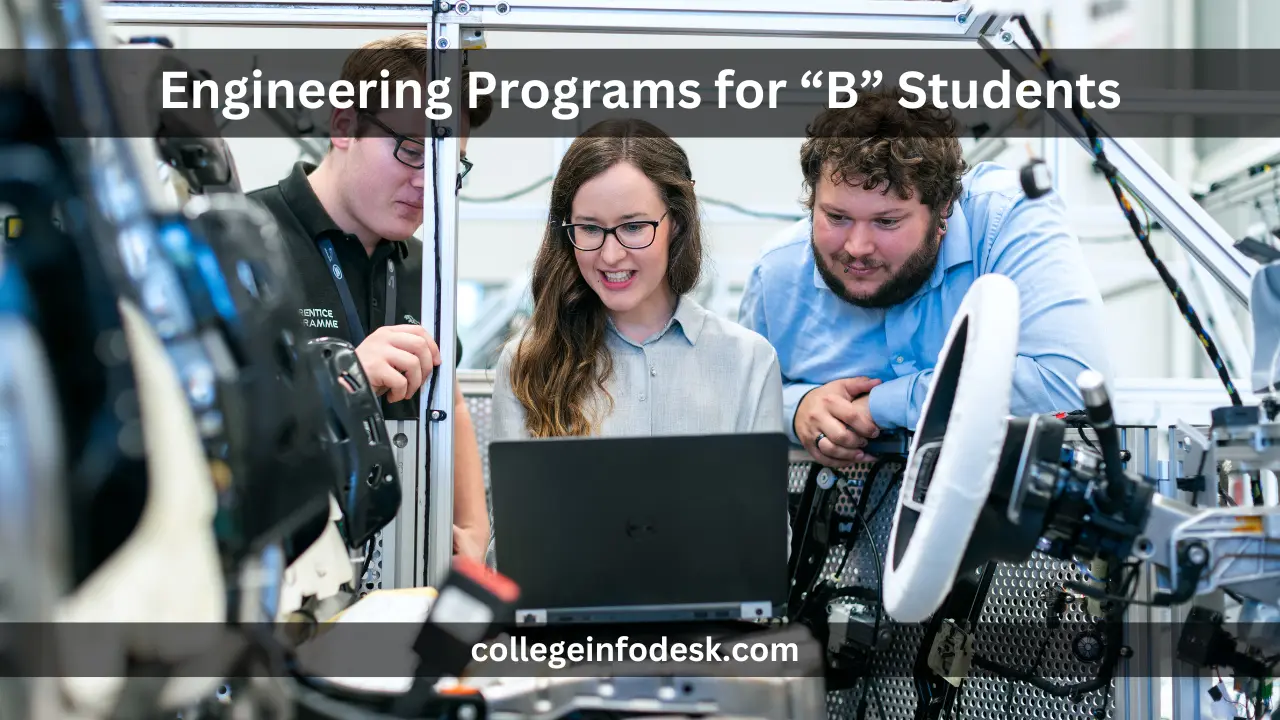Engineering is a highly regarded field that offers exciting career prospects and opportunities for innovation. However, for students who may not have achieved top grades or standardized test scores, the path to pursuing an engineering degree can seem daunting. In this article, we’ll explore the various engineering programs available for “B” students, highlighting opportunities, pathways to success, and strategies for achieving academic and professional goals in the field of engineering.
Also read Different Types of Engineering Disciplines Salary And Employment Outlook
Understanding the Challenges
Before delving into the specifics of engineering programs for “B” students, it’s essential to understand the challenges they may face. Traditional engineering programs at top universities often have stringent admission requirements, including high GPAs and standardized test scores. This can be discouraging for students who may not have excelled academically in high school but are passionate about pursuing a career in engineering.
Additionally, the perception of engineering as a highly competitive and rigorous field can deter students who do not believe they meet the academic standards required for success. However, it’s essential to recognize that there are many pathways to becoming an engineer, and success in the field is not solely determined by grades or test scores.
Exploring Alternative Pathways
Fortunately, there are numerous alternative pathways for “B” students to pursue a degree in engineering. These pathways may include attending community colleges, enrolling in specialized engineering programs, or participating in bridge programs designed to help students transition into four-year engineering programs.
Community colleges offer affordable tuition, flexible schedules, and smaller class sizes, making them an attractive option for students looking to improve their academic performance or explore different areas of engineering. Many community colleges also have articulation agreements with four-year universities, allowing students to transfer credits and seamlessly transition into bachelor’s degree programs.
Specialized engineering programs, such as those offered by technical institutes or online universities, provide hands-on training and practical experience in specific engineering disciplines. These programs may cater to students with diverse learning styles and offer opportunities for real-world application of engineering concepts.
Bridge programs, often offered by universities, aim to support students from underrepresented backgrounds or non-traditional pathways in their pursuit of engineering degrees. These programs may provide academic support, mentorship, and networking opportunities to help students succeed in challenging engineering coursework.
Finding the Right Fit
When exploring engineering programs for “B” students, it’s essential to consider factors such as program flexibility, academic support services, and opportunities for hands-on learning. Additionally, students should research faculty expertise, industry partnerships, and internship opportunities to ensure they are receiving a well-rounded education that prepares them for success in the field.
Furthermore, students should not discount the value of non-traditional pathways or alternative credentials in engineering. Certifications, apprenticeships, and industry-specific training programs can provide valuable skills and credentials that may enhance employment opportunities and career advancement prospects.
Also see Best Summer STEM Programs 2024
Strategies for Success
For “B” students aspiring to pursue a degree in engineering, there are several strategies for achieving academic and professional success:
- Develop strong study habits and time management skills to effectively balance coursework and extracurricular activities.
- Seek out academic support services, such as tutoring, study groups, and faculty office hours, to address areas of weakness and improve understanding of complex engineering concepts.
- Take advantage of internship, co-op, or research opportunities to gain practical experience and build professional connections in the field.
- Stay informed about industry trends, emerging technologies, and job market demands to tailor coursework and extracurricular activities to relevant skill sets and career goals.
- Network with peers, faculty, alumni, and industry professionals to expand opportunities for mentorship, internships, and job placements.
Conclusion
Engineering programs for “B” students offer diverse opportunities and pathways to success in the field of engineering. By exploring alternative pathways, finding the right fit, and implementing strategies for success, “B” students can achieve their academic and professional goals and make meaningful contributions to the field of engineering. As the demand for skilled engineers continues to grow, it’s essential to recognize and support students from diverse backgrounds and academic experiences in their pursuit of engineering excellence.
